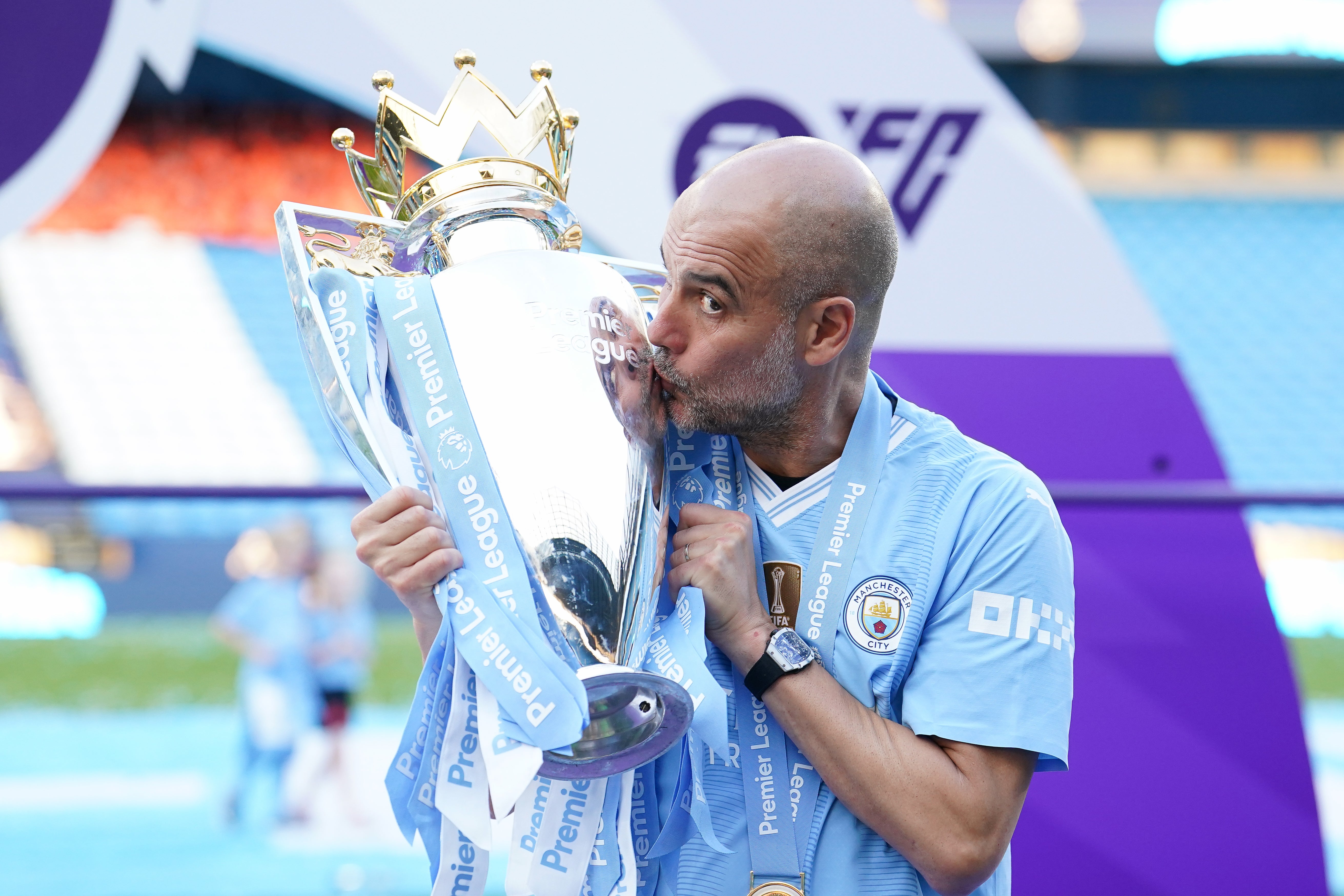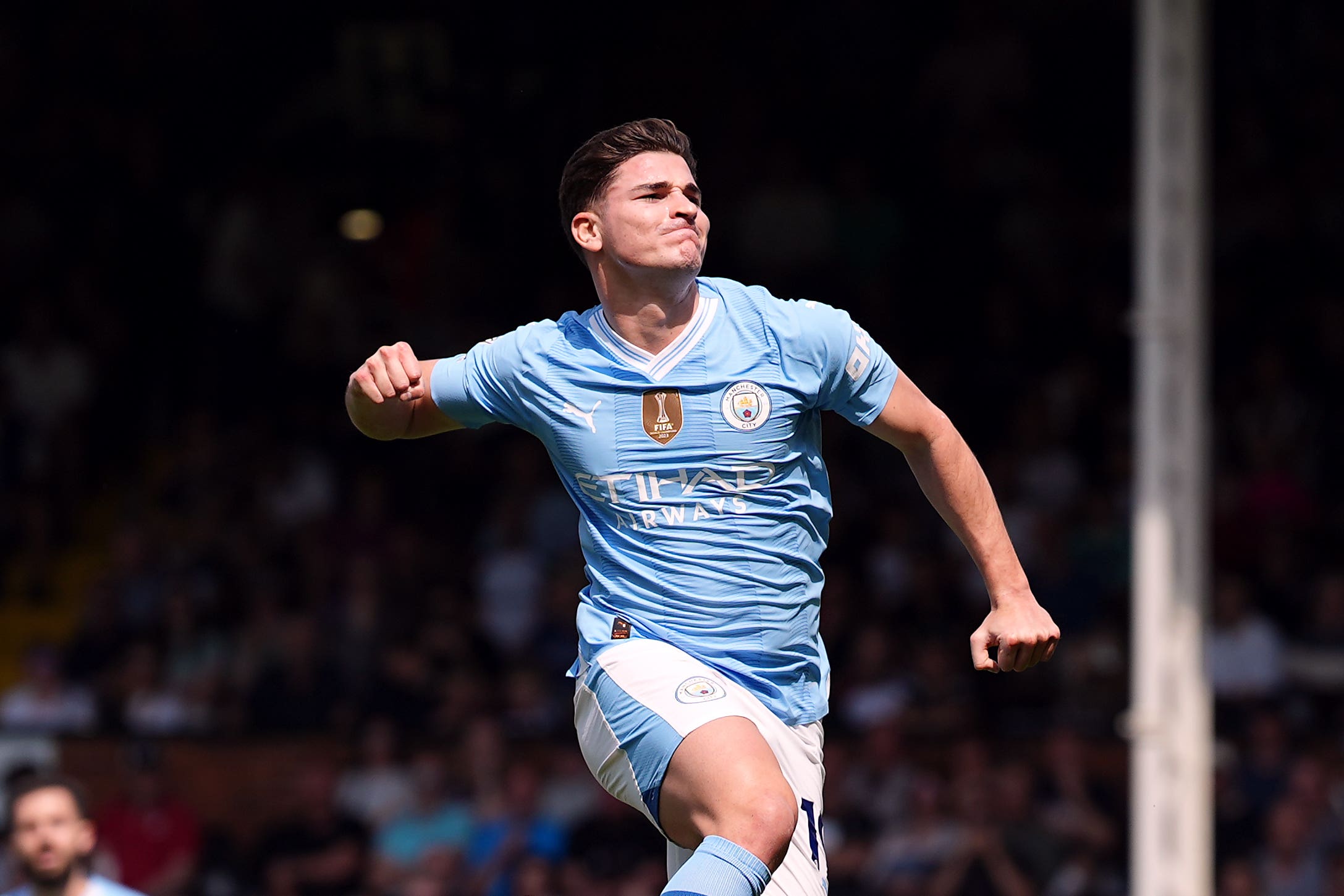Jurgen Klopp’s departure means Pep Guardiola stands alone. Only one manager who has won the Premier League still plies his trade in it and it is Manchester City’s serial champion.
Last season rendered Guardiola a history-maker in a new respect, the first manager to win four consecutive English titles. With Klopp gone, in a sense, he has eliminated the opposition. In another, he remains a marked man. “Everyone wants the crown that we have worn for four years,” he warned last week.
Guardiola’s capacity to create teams that can win both week in, week out and year in, year out adds to City’s powers of intimidation. They have a proven ability to reel off 12 or 15 straight victories. They could become the first English club to register five straight league titles, feats that have occurred in the recent past in France, Italy and Germany, but never here.
Klopp’s resignation removed one rival. Arsenal have got ever closer but the season probably starts with the expectation that it will end with City celebrating again.
And yet there are reasons to wonder if an era will end, if City will be deposed. One lies in the footballing courts, with City’s increasingly infamous 115 charges due to finally be heard with the eventual verdict likely to come this season. If it is a safe assumption it will not satisfy everyone, it has the possibility to transform the footballing landscape and to bring City’s era of domination to an abrupt end.
It is worth noting that they have long maintained their innocence. Should they be found guilty of some, let alone all, of the charges, there are a range of punishments; some could be so swingeing that retaining the title becomes improbable or impossible. Relegation would reshape the Premier League; even a sizeable points deduction would create a void, a vacancy for others.

But there is also a question about whether City will be deposed on the pitch; if others procure more points, if they regress. One way would be if Guardiola goes. He has said he is nearer the end than the start. He is in the final year of his contract, though he has been before and has resigned to extend his stay. He has a club built around him and has tied himself closer to it with his vehement defence of their actions, though none of the alleged wrongdoing in the 115 charges is by him.
When Klopp had a contract to 2026, there was a theory he would get an opportunity simply by outlasting Guardiola. Now that might be Mikel Arteta’s aim. There is a logic to assuming any successor, no matter how good, would be some kind of a downgrade.
But there are other grounds to wonder if a golden age could be ending. Guardiola’s is not the only contract expiring in 2025: Kevin De Bruyne’s does, too, and with a greater likelihood, arguably the greatest player in City’s history will leave. Certainly the Belgian is unique in his creativity; he looks irreplaceable. He is part of a growing contingent of thirtysomethings.

Kyle Walker has age-defying pace but showed signs of decline in Euro 2024. Bernardo Silva is the distance runner supreme but is in his fourth decade, too. So are John Stones, Ederson and Mateo Kovacic, while Nathan Ake will join them this season. That the goalkeeper was tempted by a summer move to Saudi Arabia may be instructive. Perhaps he felt he had won all there was to win at City.
City already had the eighth-oldest average side in the Premier League last year and the major summer departure, Julian Alvarez, was one of the younger figures. The counter-argument is that Rico Lewis, Oscar Bobb and James McAtee showed youthful talent in the Community Shield, that Savinho is a 20-year-old signing, that Phil Foden, at 24, gravitated to world-class level last season and Erling Haaland, the same age, is a peerless goal machine. There is the makings of another side, of a future beyond De Bruyne and Walker and Silva.
Certainly City can project an air of business as usual: of not panicking about the charges, of planning for the long term. But there is also a strange passiveness: in the Guardiola years they have not bought for the sake of it and have purchased fewer players than many other clubs, let alone Chelsea, but a reluctance to pay beyond their valuation of players, the manager’s preference to work with a smaller squad and a fixture list crowded still further by the Club World Cup could leave a club with a lone recruit this year looking short-staffed.

Rodri has shouldered a huge workload in recent seasons and City have no other specialist defensive midfielder; should the Spaniard break down, they may regret not activating Bruno Guimaraes’ £100m release clause at Newcastle. City can find ways of coping without Alvarez in midfield but his sale to Atletico Madrid means that Haaland is now the lone out-and-out centre-forward.
City have excelled in finding ways to win without players, both when Haaland and De Bruyne were injured last season and following the departures of Riyad Mahrez and Ilkay Gundogan, but there could come a point when there is an absentee too many or too many cases of ageing. Or just when City slip a little, someone else could improve.
It might not happen yet. But if part of Guardiola’s skill is to create an impression of permanent domination, and a fifth consecutive title would underline that, the reality is that eras end. City’s might this year, or next: it may last for several more seasons. But, their rivals can console themselves, nothing lasts forever.








